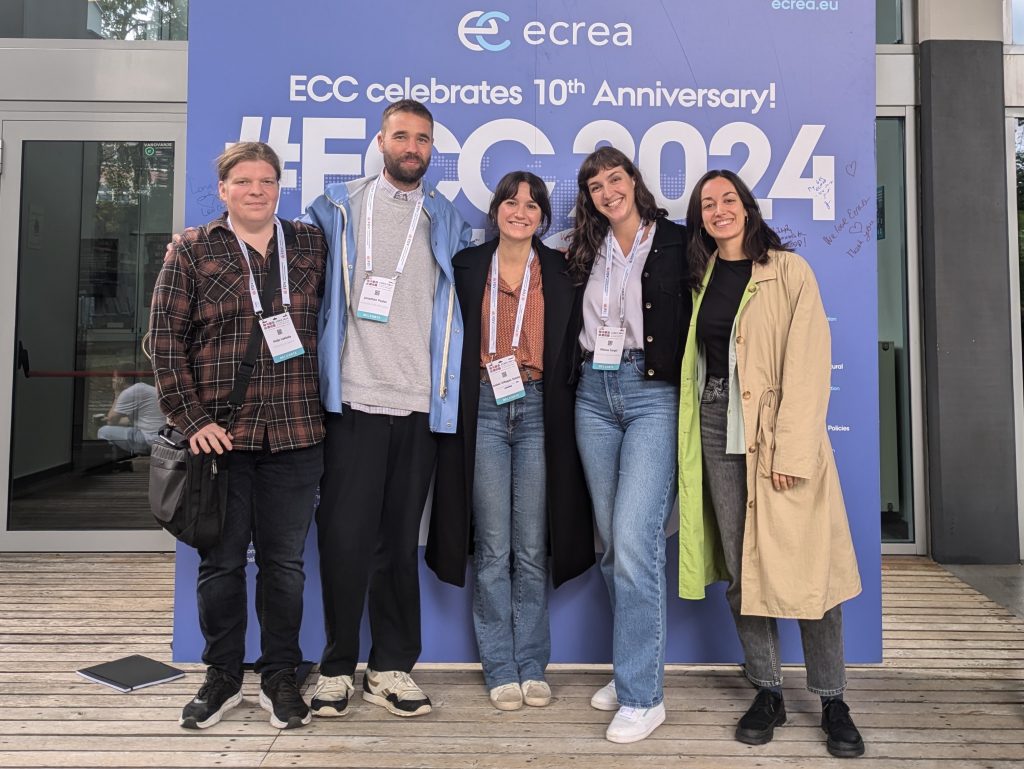
NEWS


NEWS
Published
In this month’s blog post, Dr Jonathan Paylor (Postdoctoral Researcher at the University of the Arts London) discusses ReDigIm’s participation in the 10th ECREA European Communication Conference which was held in Ljubljana in September 2024.

The 10th ECREA European Communication Conference took place in Ljubljana, Slovenia, from 23 to 27 September 2024. Centred around the theme of ‘communication & social (dis)order’, the conference saw communication scholars from across Europe reflect on the role that technological developments and changing communicative practices play in disrupting and reproducing the social order.
On the fourth day of the conference, Postdocs from across the ReDigIm consortium participated in a panel, ‘Disrupting the Welfare state?: Crowdfunding platforms and digital redistributive imaginaries’, organised by Mercè Oliva (Principal Investigator for the Universitat Pompeu Fabra (UPF) research team). The theme of the panel resonated with the keynote lecture by Vesna Leskošek (Professor at the Faculty of Social Work, University of Ljubljana) who spoke about discourses of benefit fraud destabilising welfare states. In taking up the question of changing welfare states, our panel focused on the remaking of welfare states in light of new trends in voluntary giving driven by digitalisation, particularly the rise of ‘social cause crowdfunding’.
The panel consisted of five papers based on work package two which is led by Mercè and the UPF team. We first heard from Mercè who presented a co-authored paper with Rebecca Bramall (Project Leader and Principal Investigator for the UAL research team). In setting out ReDigIm’s theoretical and methodological framework, their paper argued for a mixed method-approach that is attentive to the imaginaries of the digital inscribed in and reproduced by crowdfunding platforms and other digital giving tools and how such material-discursive relations are bound up with the remaking of European welfare states.
Subsequent papers focused on crowdfunding and other forms of digital giving in particular nation states. Drawing on our analysis of platforms operating in the UK, I explored the ambivalences of crowdfunding, paying attention to how crowdfunding platforms both effectuate mechanisms of control that are characteristic of platform capitalism and also bear traces of an alternative social order centred around participatory modes of governance and collective forms of ownership.
We next heard from Isa Villages (Postdoctoral Researcher for the UPF team) who presented a paper co-authored with colleagues from UPF and based on an analysis of various Spanish crowdfunding platforms. This paper similarly drew attention to the ambivalences of crowdfunding, highlighting how some platforms reinscribe neoliberal conceptions of philanthropy and the State while others give voice to collectivist ideas of democratisation and the commons.
Isa’s presentation was followed by Keijo Lakkala (Postdoctoral Researcher for the University of Lapland team). In a joint paper with Marleena Huuhka (also a Postdoctoral Researcher for the University of Lapland team) which focused on various fundraising websites operating in Finland, Keijo foregrounded the sociomateriality of digital giving, bringing into focus the interrelations between human and non-human elements that shape the affordances for action.
The final presentation came from Milana Čergić (Postdoctoral Researcher for the University of Mainz team) who delivered a co-authored paper with Čarna Brković (Principal Investigator for the University of Mainz team) based on an analysis of digital fundraising in Montenegro. In reflecting on how crowdfunding in Montenegro bears the traits of a ‘digital periphery’, Milana and Čarna’s paper revealed patterns of conditional inclusion and partial exclusion from European financial and digital infrastructures.
The papers provoked an insightful and engaging Q & A. One of the key questions raised related to the different and unpredictable ways in which people use crowdfunding platforms and other digital giving tools. Our platform analysis which formed the basis of work package two provided only limited answers to this question. As we have now moved on to work package three and have begun to explore how civil society groups are utilising digital technologies we are beginning to develop a richer insight into such dynamics.